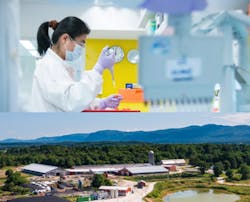Farm to Pharma: Drugmaker AstraZeneca signs RNG supply deal for U.S. Manufacturing
With the mission critical energy needs of the health care industry, pharmaceutical leaders are seeking a clear connection between resiliency and sustainability goals. Nearly two years ago, sector players including AstraZeneca, Biogen, GSK, Johnson & Johnson and Novartis, among others, announced a collaboration on ways to decarbonize their supply chains.
And some of them are extending those actions aimed at Net Zero by securing lower carbon energy resources to deal with Scope 1, or on-site, energy emissions. AstraZeneca announced this week it is partnering with Vanguard Renewables on an energy agreement to deliver renewable natural gas.
The RNG project with Vanguard, which could be completed by 2026, would connect RNG pipelines and delivery to AstraZeneca’s U.S. research and manufacturing sites. The first such RNG-supplied site begins in Newwark, Delaware, this month and moves outward from there over the years.
“We recognize the interconnection between the health of people and the planet, and are committed to driving deep decarbonization across our operations and value chain,” Pam Cheng, Executive Vice President of Global Operations & IT and Chief Sustainability Officer at AstraZeneca, said in a statement. “Our innovative partnership with Vanguard Renewables in the U.S. is an illustration of how we are collaborating at scale to deliver sustainable science and medicines, as part of the transition to net zero health systems and a circular economy.”
Under the agreement, Vanguard Renewables would leverage food and beverage waste from the manufacturing sector, as well as cow manure from agricultural operations, and convert that into renewable natural gas. The conversion would reduce both carbon emissions and methane, which is considered multiple times more damaging to the environment than CO2.
By 2026, this agreement could result in enough RNG delivered to generate about 190,500 MWh per year across AstraZeneca’s U.S. sites, equivalent to heat/power for 17,800 homes annually.
The Newark site is where the company packages 26 different medicines for distribution across the U.S. and makes medicine formulations for global supply.
Vistin Pharma signs Renewable PPA with Norway's Statkraft
Pharmaceutical Giants team up to energize Clean Power Procurement across Supply Chains
Vanguard Renewables will create the RNG through its farm-based anaerobic digestion and conversion process culled from local and family-owned farms, creating a revenue stream for the company and nearby farming operations. Once the RNG is produced and captured through the digestors, it would be injected into existing natural gas infrastructure where it can accessed by AstraZeneca for its research and manufacturing processes.
“AstraZeneca has set a very ambitious and challenging net zero target, which is a benchmark for their sector and other global corporations,” Neal H. Smith, Vanguard Renewables CEO, said in a statement. “We strongly believe this partnership will provide a path for other like-minded companies to join us on the journey towards global decarbonization.”
U.S. pharmaceutical companies are behind European counterparts in accelerating decarbonization goals, according a 2021 story by S&P Global Market Intelligence. Firms such as Novo Nordisk and Novartis have detailed ambitious clean energy and carbon reduction plans, spurred by good intentions and perhaps also European Union threats of financial penalties for emissions.
U.S.-based pharmaceuticals such as Merck and Eli Lilley have publicly vowed to overhaul drug manufacturing methods to create better energy efficiencies and smaller carbon footprints, according to S&P.
About the Author
Rod Walton, EnergyTech Managing Editor
Managing Editor
For EnergyTech editorial inquiries, please contact Managing Editor Rod Walton at [email protected].
Rod Walton has spent 17 years covering the energy industry as a newspaper and trade journalist. He formerly was energy writer and business editor at the Tulsa World. Later, he spent six years covering the electricity power sector for Pennwell and Clarion Events. He joined Endeavor and EnergyTech in November 2021.
Walton earned his Bachelors degree in journalism from the University of Oklahoma. His career stops include the Moore American, Bartlesville Examiner-Enterprise, Wagoner Tribune and Tulsa World.
EnergyTech is focused on the mission critical and large-scale energy users and their sustainability and resiliency goals. These include the commercial and industrial sectors, as well as the military, universities, data centers and microgrids. The C&I sectors together account for close to 30 percent of greenhouse gas emissions in the U.S.
He was named Managing Editor for Microgrid Knowledge and EnergyTech starting July 1, 2023
Many large-scale energy users such as Fortune 500 companies, and mission-critical users such as military bases, universities, healthcare facilities, public safety and data centers, shifting their energy priorities to reach net-zero carbon goals within the coming decades. These include plans for renewable energy power purchase agreements, but also on-site resiliency projects such as microgrids, combined heat and power, rooftop solar, energy storage, digitalization and building efficiency upgrades.

